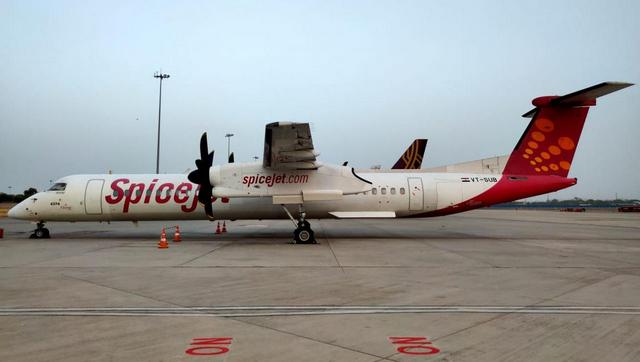SpiceJet on Thursday said it has converted three of its Bombardier Q400 passenger aircraft into freighters. With the addition of these three cargo planes, SpiceJet now has a dedicated fleet of eight freighter aircraft. The three converted Q400 cargo planes will primarily be used for operations to smaller towns and cities. Ajay Singh, Chairman and Managing Director, SpiceJet, said, “Our cargo operations are doing extremely well and to address the increased demand we have converted three Q400 passenger aircraft into freighters. These are our old 78-seater Q400s and have a cargo capacity of 8.5 tons each. These smaller cargo planes are perfectly suited for operations to Tier II & III cities and to remote and hilly areas in the North East, Jammu & Kashmir, Himachal Pradesh.”
. @flyspicejet converts 3 of its Bombardier Q400 passenger aircraft into freighters. With the addition of these 3 cargo planes, co now has a dedicated fleet of 8 freighter aircraft. The 3 converted Q400 cargo planes will primarily be used for operations to smaller towns & cities pic.twitter.com/a5J9JsIbk5
— CNBC-TV18 (@CNBCTV18Live) May 28, 2020
He further said, “There is an opportunity in every crisis and at SpiceJet, we have been constantly innovating and adapting to changing situations. Today, our cargo network spans over 25 international destinations most of which we added during the lockdown period. We see a tremendous potential in the cargo business and will continue to expand in the times to come.” Click here to follow LIVE news and updates on stock markets SpiceJet has transported over 12,000 tons of cargo on more than 1690 flights since the nation-wide lockdown began transporting medical and surgical supplies, sanitizers, face masks, coronavirus rapid test kits, IR thermometers etc. and providing doorstep deliveries of essential supplies, medicines and medical equipment to various cities in India, company said in a press release. Click here to follow LIVE updates on coronavirus outbreak The airline had launched its dedicated cargo arm, SpiceXpress, in September 2018. SpiceJet operated the country’s first cargo-on-seat flight on 7 April carrying vital supplies in passenger cabin and belly space. Since then, the airline has been regularly deploying its B737 and Q400 passenger aircraft to carry cargo in the passenger cabin. India imposed lockdown from 24 March midnight to curb the spread of coronavirus. However, cargo flights, medical evacuation flights and special flights permitted by the aviation regulator DGCA have been allowed to operate as usual. After a two-month gap, domestic passenger flights resumed in India from 25 May. However, international passenger flights continue to remain suspended in the country. (With PTI inputs)


)

)
)
)
)
)
)
)
)



